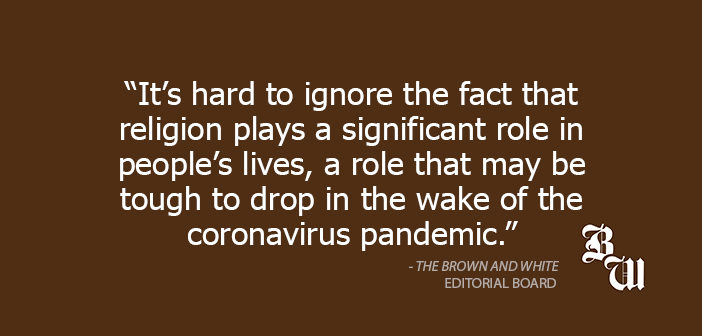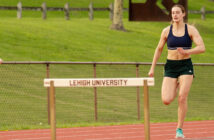The year was 1349 when Jerusalem’s Church of the Holy Sepulcher was closed — the Black Plague was decimating and obliterating populations. Now, the church is closed again.
Why is this a big deal, and what is the main message here? Responsibility.
The word we have heard time and time again over the last month. A responsibility to keep ourselves safe. A responsibility to keep others safe. A responsibility to adhere to the recommendation of health and government officials.
But what about our religious responsibilities? It goes without saying that there is a significant population of the world that does not abide by any religious policy. And those who are religious may not strictly follow specific guidelines.
With that said, it’s hard to ignore the fact that religion plays a significant role in people’s lives, a role that may be tough to drop in the wake of the coronavirus pandemic.
Right now marks the thick of an important holiday stretch for many — Passover and Easter. When the holidays stand for a time of social gathering and community, how do we balance traditions with our responsibility to keep each other safe?
Religion is a sensitive topic and should always be treated as such. But these are extraordinary times. We don’t all share the same religious beliefs, but we all share the same responsibility to keep distant and defeat this virus.
Around the world, religious sites are barred from the public, in hopes that limiting a mass congregation of people will help alleviate the tension that stretched healthcare systems have faced.
In March, Saudi Arabia made the decision to suspend the holding of prayers in mosques around the country. Photographs of the Vatican have been empty.
There have been instances, however, of people acting against the recommended social distancing practices.
In Florida, Gov. Ron DeSantis issued a stay-at-home order that does not bar churches from holding services.
In Louisiana, a packed Palm Sunday service was held recently, despite the pastor being issued a summons for violating the government’s ban on large gatherings.
And in Israel, police officers went undercover to bust illegal gatherings at a synagogue, a practice deemed illegal by the government.
These are just a few examples, but they represent the overarching issue of this theme. Why might this be bad? Because mass congregation is a step in the other direction in regards to tackling the virus.
According to an article from ABC News on Monday, New York Governor Andrew Cuomo said, “I don’t care if you’re Orthodox Jews, Catholic, Christian. It’s not about religion. What right do you have to act irresponsibly? None of us has the right to be reckless in our behavior.”
And he’s not wrong. To defeat the virus means to act responsibly, together, and do what’s best for each other’s safety. It might mean breaking tradition, but it’s for the common good.
There are different ways to go about this, such as spending the holidays with people you have been quarantining with, or close family members, but officials have warned against mass gatherings.
The holidays are meant to be shared with others, and it’s a heartbreaking aspect to give up. But, if you choose to practice the recommended social distancing, you may look back on how you managed this crisis and know that you honored your responsibility.
Social distancing might be one of the more frustrating or confusing practices that we, as a society, have been asked to do in mass. It keeps loved ones apart, it separates friends, and it builds a backdrop of loneliness.
When this is all over, however, we’ll surely look back on the era of the coronavirus, proud of the way we kept each other safe and motivated. There will be a time to celebrate our holidays, and there will be a time to gather in masses.
But it all starts with the determination, and the responsibility, to think bigger than ourselves.






Comment policy
Comments posted to The Brown and White website are reviewed by a moderator before being approved. Incendiary speech or harassing language, including comments targeted at individuals, may be deemed unacceptable and not published. Spam and other soliciting will also be declined.
The Brown and White also reserves the right to not publish entirely anonymous comments.
1 Comment
According to an article from ABC News on Monday, New York Governor Andrew Cuomo said, “I don’t care if you’re Orthodox Jews, Catholic, Christian. It’s not about religion. What right do you have to act irresponsibly? None of us has the right to be reckless in our behavior.”
If you are a believer, it should be about religion; as a Christian one is taught to care for the other as well as oneself; social distancing and other actions are totally in line with that teaching. There are more good reasons for believers and non-believers to work together.
I have a complaint about the governors focus on the negative: “None of us has the right” which is in keeping with the attitude that if you have the right or legal ability to do something you can do it. This is LAW. JUSTICE demands we do what is equitable and beneficial. Justice demands that we act responsibly.
Hopefully this terrible pandemic will help us to act more responsibly in our lives.